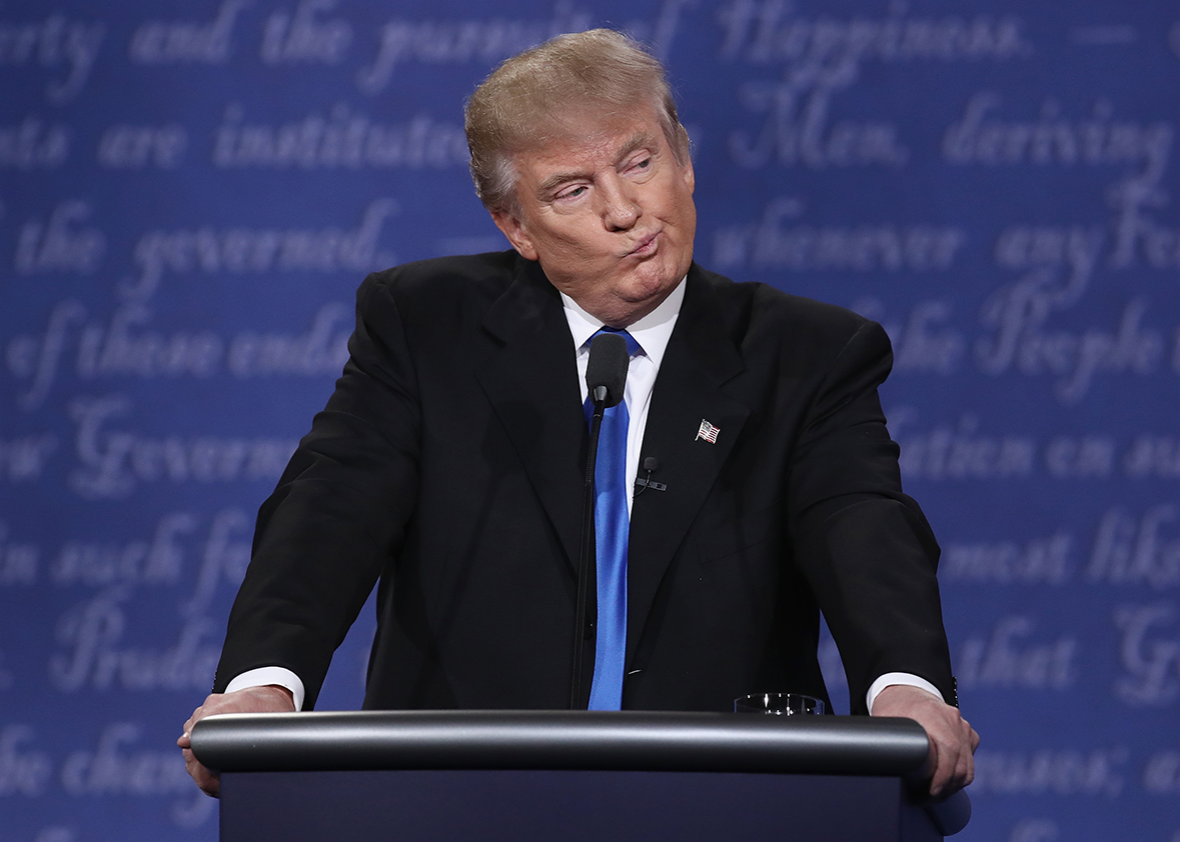Donald Trump likes to freestyle. In his overheated, screwball way, he’s a master of the form. His improvisational skills are pretty much the core of his appeal—he’s not scripted, he’s good television. His faith in his ability to let it rip is the essence of his swagger, which apparently appeals to a vast audience. There aren’t many people who can pull it off, and it has worked far better than anyone could possibly have imagined. Monday night, however, his improvisational skills failed him—and he slammed up against the limits of his political talents.
He came into the debate with a reasonable strategy: Talk about trade and narrowcast his message to the three Rust Belt swing states that could snake him past 270. The script held for nearly 10 minutes, but he didn’t have much of a strategy beyond that opening riff. Without a considered plan—without canned lines, without prepared counterattacks, without secondary talking points—he found himself constantly on the defensive. More often than not, the subject shifted to Trump and his record. The evening summed to a fairly comprehensive review of the opposition research file on the man, though there wasn’t enough time to get to Trump University or his so-called charitable foundation. Even Trump’s talent for improvisation was challenged. Answers that could have been easily anticipated by a disciplined candidate were occasions for incoherent free association. Hillary, on the other hand, found herself only slightly dinged on the email issue—and even then, she had only to fight off the lazy man’s inarticulate version of the case against her.
In the past, Trump has done a passable job working his way out of jams. His approach usually involves a few lines of bluster, a few fudges of truth, and a bull rush to change the subject. Trump does a good job of talking over interviewers and his opponents, running down the clock. That strategy works fine on a phoned-in interview to a Sunday-morning show or in a primary debate with a full stage of politicians clamoring for attention. But it wasn’t up to this challenge. Lester Holt may not be the most forceful interlocutor in the history of journalism, but he gently pressed Trump on birtherism and taxes. His questions permitted Clinton enough time and space to corner him on these issues. Throughout the night, she did a good job of pivoting from broader policy questions to his personal weaknesses.
Without a plan for controlling the debate, Trump failed to get to some of core issues. He has made immigration a cornerstone of his campaign, yet he only managed to get to the subject at the very end of the evening and only in passing. He never got around to mentioning the Clinton Foundation or any of his other rote attacks on Clinton’s character.
Improvisation isn’t just Trump’s go-to strategy; it’s his go-to excuse, and a weak one. Did he initially support the Iraq war? Well, he was just gabbing without thinking, when he said that on The Howard Stern Show. What about his criticisms of NATO? Those comments were made without much forethought, he said. Unfortunately, the remarks managed to scare the hell out of our allies. Half-baked comments on hair-trigger subjects aren’t so easy to take back. Monday night Trump flailed badly with lame efforts to rebottle those riffs as brassy politics.
Much of the past month, Trump has tried to leave behind his seat-of-the-pants style. More accurately, Kellyanne Conway has managed to shove him into the political equivalent of a padded room. He’s been tethered to the teleprompter; his handlers have limited his paroxysms of tweets. Conway’s instincts were, of course, profoundly correct. Monday night, on his own on stage for 90 minutes, Trump had nothing to fall back on but his instincts, and he improvised his way to infamy.
